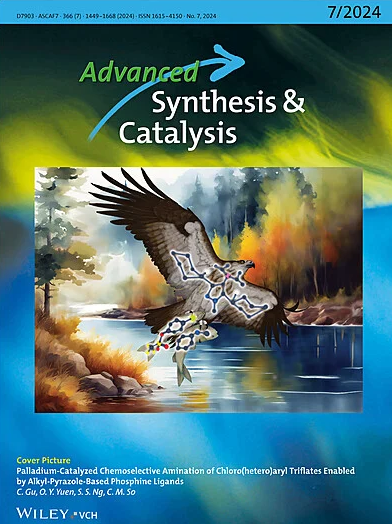3,4-二氰基-2,5,6-三氟苯基苷作为用于化学糖基化的缺电子芴糖基捐赠者
IF 4.4
2区 化学
Q2 CHEMISTRY, APPLIED
引用次数: 0
摘要
在此,我们介绍了 3,4-二氰基-2,5,6-三氟苯基苷,作为稳定的、反应性强的缺电子氟碳烯基糖基供体,可一步制备并用催化量的 TMSOTf 活化。糖基化反应条件对酸碱敏感的保护基具有耐受性,并且具有不同的底物范围,产率为 68-89%。含氟烯的缺电子糖基供体可以使用游离醇和硅烷化醇以及 C-亲核物作为受体,构建 O-和 C-糖苷。本文章由计算机程序翻译,如有差异,请以英文原文为准。
3,4‐Dicyano‐2,5,6‐Trifluorophenyl Glycosides as Electron‐Deficient Fluoroarene Glycosyl Donors for Chemical Glycosylation
Here, we present 3,4‐dicyano‐2,5,6‐trifluorophenyl glycosides as bench‐stable, and reactive electron‐deficient fluoroarene based glycosyl donors that can be prepared in one‐step and be activated with catalytic amounts of TMSOTf. The glycosylation reaction conditions show tolerance towards acid/base sensitive protecting groups and have a different substrate scope with 68–89% yields. The electron‐deficient fluoroarene‐containing glycosyl donor enables the construction of O‐ and C‐glycosides using both free alcohols and silylated alcohols, as well as C‐ nucleophiles as acceptors.
求助全文
通过发布文献求助,成功后即可免费获取论文全文。
去求助
来源期刊

Advanced Synthesis & Catalysis
化学-应用化学
CiteScore
9.40
自引率
7.40%
发文量
447
审稿时长
1.8 months
期刊介绍:
Advanced Synthesis & Catalysis (ASC) is the leading primary journal in organic, organometallic, and applied chemistry.
The high impact of ASC can be attributed to the unique focus of the journal, which publishes exciting new results from academic and industrial labs on efficient, practical, and environmentally friendly organic synthesis. While homogeneous, heterogeneous, organic, and enzyme catalysis are key technologies to achieve green synthesis, significant contributions to the same goal by synthesis design, reaction techniques, flow chemistry, and continuous processing, multiphase catalysis, green solvents, catalyst immobilization, and recycling, separation science, and process development are also featured in ASC. The Aims and Scope can be found in the Notice to Authors or on the first page of the table of contents in every issue.
 求助内容:
求助内容: 应助结果提醒方式:
应助结果提醒方式:


